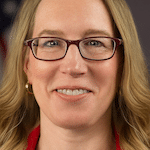

Hester Peirce, commissioner at the U.S. Securities and Exchange Commission and head of the SEC’s newly created crypto task force, and Caroline Pham, acting chairman of the U.S. Commodity Futures Trading Commission, each spoke at The Digital Assets Innovation Summit hosted by City & Financial Global on 2 July 2025 in London.
Peirce said it is very important for the regulator to work bilaterally with other jurisdictions and multilateral organisations. She added: “I suggested that we try to create a framework in which entities, people or projects who are trying to do things across borders in multiple jurisdictions, can test commercial viability.”
However, she continued that she does not want to put a lot of work into something which will not be used, so this will be dependent on demand.
International testing would allow regulators to share information, share how well projects are working and learn lessons on what a regulatory regime should look like according to Peirce. In addition, she said that a key feature that would be needed is an off ramp to allow successful projects to move from testing into the market.
“It is difficult to work in even one jurisdiction but it’s important for us to try because this is a cross-border industry,” she added. “I don’t think this is a zero sum game because we all benefit from vibrant, competitive, dynamic economies so we should be working together.”
Pham added that she had suggested a digital asset markets pilot program back in 2023 and the CFTC has had successful pilots since the 1990s.
“The pilots are not restricted to the U.S, so they would be open to participants from all countries,” she added.
SEC
Peirce was asked how the SEC’s crypto task force plans to resolve the long-standing uncertainty around whether specific digital assets are classified as securities or commodities, and the criteria for the taxonomy that will guide these determinations.
She replied that the U.S Congress is working on potential legislation which will set these parameters. However, the SEC has held a series of crypto roundtables and the agency believes that most tokens do not fit into the securities bucket.
“That does not mean that they cannot be sold as part of a securities transaction, and if they are, that is something we regulate,” she added. “We will be trying to identify the scope of that capital raising transaction and the disclosure and registration regime which make sense for this particular area.”
Peirce continued that tokenized real world assets can also be securities, such as tokenized stocks.
“You can also create a token that has characteristics that pull it within the traditional definition of a stock, bond or a note,” she said. “We have a lot of work to do around when a token is the subject of an investment contract, which is one type of security in the United States.”
The commissioner has been critical about the SEC’s use of enforcement in crypto, which she described as a blunt instrument that added to confusion about regulation and had the appearance of being arbitrary. As a result, an environment is created in which the wrongdoers do better than people who are trying to build something legitimate. Peirce argued that the lack of a legitimate framework led to entities that served U.S investors setting up overseas, such as FTX.
“Once you get a framework in place so projects can register and make disclosures, then it will be much easier to bring enforcement pursuant to those rules,” said Peirce.
She continued that the best way of protecting investors is to allow innovation to make sure that marketplaces are dynamic. New entrants who have better ideas shoild not face undue regulatory barriers to entry and incumbents should be able to try new things on a timely basis.
“Another point that’s really important to remember is that the core of this technology is disintermediation,” she added. “There can be a tendency for regulators to try to centralize everything and that is not a good idea.”
CFTC
With regards to disintermediation, Pham argued that decentralised finance (DeFI) protocols are the equivalent of software, but the operator of a platform that uses this software to provide access to financial services has to be properly authorized. Pham also highlighted that intermediaries play an important role in the CFTC regulatory framework, because they are responsible for customer protection, know your customer disclosures, reporting and various other safeguards.
She believes the same principles that regulators use to address algorithmic trading or automated market makers can be applied to DeFi protocols.
‘’It’s really important that we focus on the activity and not the technology,” said Pham. “For example, many people do illegal things on the internet but the internet is not illegal. Doing illegal things on the internet is illegal.”
Pham was asked if any form of equivalence or mutual recognition regime is being discussed between the UK and U.S. in relation to the crypto frameworks which are being put in place.
She said the CFTC was keen not to repeat the mistakes of the past when the Dodd Frank Act was implemented in 2010 after the 2008 financial crisis.
“We must not do a Dodd Frank for crypto, which had so many duplicative, costly, burdensome, unnecessary registration, compliance and reporting requirements that only the largest firms could keep up with that overhead,” she said.
Pham used to oversee a $1bn compliance program that involved 1,000 full-time employees. She argued that this regulatory burden led to consolidation, which can bring concentration risks and other dangers to financial stability.
“We also need to think about market fragmentation, particularly for digital asset markets which are inherently borderless, and ensuring that mutual recognition is built into that approach,” she added. “Unfortunately that really has not been the dialog in the United States and it has not been a feature of the legislative proposals.”
In March Pham had suggested that mutual recognition is build into the CFTC’s existing registration categories,
‘We’ll be able to actually hit the ground running from day one which is really important from a U.S. perspective because we are far behind the rest of the world In providing regulatory clarity,” she argued.
Pham also highlighted there is a gap between the time when legislation passes and when the rules get written. In the case of the Dodd Frank Act it took the CFTC four to five years to complete the full consultation and rule writing. However, the CFTC has got a broad and flexible authority to use exemptive relief in order for experimentation to be allowed as the regulator has long had a dual mandate of promoting responsible innovation and fair competition.
Pham said: “That’s actually how the CTC first created a regime around OTC derivatives back in the 1990s and a regime around retail FX trading in the 2000s. It’s something that we could use now, certainly for leveraged or margined spot crypto being listed on our futures exchanges.or being offered by our futures commission merchants.”








